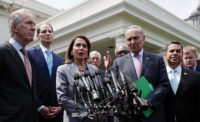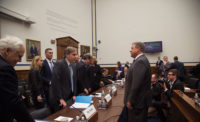Construction and Coronavirus
Trump, Democrats Talk Up Big Infrastructure Plans
Interest in legislation creating a wide-ranging infrastructure investment program is stirring again, with President Trump weighing in on the idea of a $2-trillion plan and House Democrats backing a larger version of what was a $768-billion package they announced in late January.
Neither Trump nor the Democrats said how they plan to pay for the massive infrastructure programs.
Trump and the House Democrats indicated they would like to see infrastructure funding be included in another, not-yet-drafted measure to provide further help in responding to the coronavirus pandemic.
Three coronavirus response bills have been enacted in recent weeks, most recently the $2-trillion Coronavirus Aid, Relief and Economic Security, or CARES, Act, signed into law March 27.
But leading Republicans in Congress reacted in a chilly fashion to the Democrats’ new plan, fearing it could also include environmental and tax provisions that the GOP doesn’t like.
Moreover, recent history produces skepticism about the odds for infrastructure legislation. Trump has floated big-dollar infrastructure proposals before, but none of them went anywhere in Congress.
Nevertheless, Trump caused a bit of a stir with a March 31 tweet calling for a $2-trillion infrastructure program. The plan, he said “should be VERY BIG & BOLD” and “be focused solely on jobs and rebuilding the once great infrastructure of our Country!”
He also noted that interest rates in the U.S. are “at ZERO” and said “this is the time to do our decades long awaited Infrastructure Bill.”
One day later, House Democrats, led by Speaker Nancy Pelosi (Calif.), told reporters in a conference call that they would like to see substantial funding for transportation and other public-works categories. “We must take bold action to renew America’s infrastructure,” she said.
The American Public Transportation Association welcomed Trump's and Democrats' interest in infrastructure legislation. Paul Skoutelas, APTA's president and chief executive officer, said in a statement, "Increased investment in infrastructure creates jobs and strengthens local economicies, and that is exactly what America needs right now."
The starting point for the Democrats' plan is a $760-billion, five-year proposal they outlined on Jan. 29.
Lawmakers indicated that the new plan would add $10 billion for community health centers to that $760-billion framework and increase the $86 billion that the earlier plan had for broadband.
But Republicans didn't embrace House Democrats' proposal. Senate Majority Leader Mitch McConnell (R-Ky.) said in a radio interview, “I think we need to wait a few days here, a few weeks, and see how things [from the CARES Act] are working out.”
McConnell added, “I’m not going to allow this to be an opportunity for the Democrats to achieve unrelated policy items that they would not otherwise be able to pass.”
House Minority Leader Kevin McCarthy (R-Calif.) didn’t categorically rule out a new measure to respond further to the impact of the coronavirus, saying in an April 1 statement that his GOP colleagues “stand ready to work across the aisle to support the individuals and institutions that will need more help in the fight against the virus.”
But McCarthy said that “the American people cannot afford the distraction of continued attempts to force partisan objectives into our response.” In particular he objected to ideas backed by Democrats such as revamping the country’s electricity grid.
But Democrats said their revised plan would help the economy. House Transportation and Infrastructure Committee Chair Peter DeFazio (D-Ore.) said, “This is rebuilding America and preparing us for the 21st Century in so many ways.” He added, "We want to put people first, workers first, and nothing does that more than the investments we’re talking about here.”
DeFazio also said that infrastructure reconstruction includes rebuilding so that buildings and other facilities would be better able to withstand storms, floods and other natural disasters.
He called for using construction materials that are “less carbon-intensive” and advocated reducing fossil-fuel use in the transportation sector.
Pelosi noted that the Democrats' and Trump's ideas aren't that far apart. She said Trump’s $2-trillion concept probably would extend over 10 years, and thus was “in the same ballpark” as Democrats’ $770-billion-plus over five years.
She said that House committee chairs have for some time been drafting their sections of the envisioned infrastructure legislation and work could continue during the next several weeks while the House and Senate are away.
The outline Democrats created in January includes substantial amounts for transportation: $329 billion for highways, $105 billion for transit, $30 billion for airports and $19.7 billion for seaports.
In addition, it would provide $251.4 billion for drinking water, $50.5 billion for clean water/wastewater treatment and $10 billion for inland waterways and other water resources.





